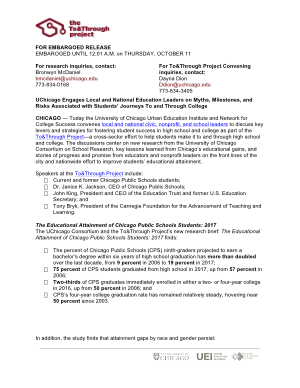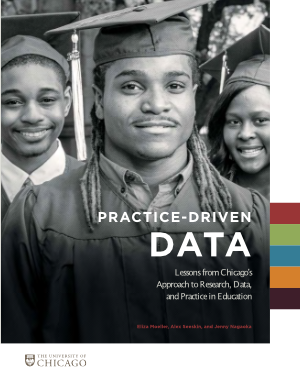1. How, when, why, and under what circumstances has the use of data supported educators in creating meaningful improvements in student outcomes?
2. What are the most important lessons we have learned across the UChicago Consortium, To&Through, and NCS about supporting effective data use in schools?
3. What implications do those lessons have for people using data at the school level; people designing data systems for educators to use; and people conducting the research and analysis that will generate indicators and data behind the systems.
This new paper, from the UChicago Consortium, Network for College Success, and the To&Through Project, shares key lessons learned from Chicago’s approach to using data to foster ongoing improvement in students’ educational attainment.
This paper is designed to share the lessons we have learned about how, when, why, and under what conditions we have seen this practice-driven data approach support real and sustainable improvement. It is intended to share these lessons with advocates, policymakers, district and school leaders, and school support organizations, both locally and nationally, so they can develop the conditions that will support effective data use in schools and school systems.
Taken together, these five lessons from Chicago form an approach to data use focusing stakeholders at various levels on the most important goals and features of an ecosystem of data use that has the potential to catalyze systematic improvement in student outcomes. First, it is important to build capacity to facilitate hard conversations and use data collectively to spur action, which requires an emphasis on trust, collaboration, and culture. Second, the wide availability of data and the scarce resource of time requires that educators and leaders prioritize research-based indicators that matter most for students’ success. Third, educators can use relevant research evidence to make meaning of the data they use, and to develop shared ownership over the implications of the research. Fourth, using data effectively to guide practice requires that educators and leaders use the right data at the right time of the school year. Finally, there is no more important use of data in public schools than as a tool to identify and stop inequities that continue to leave the most vulnerable students further and further behind.




